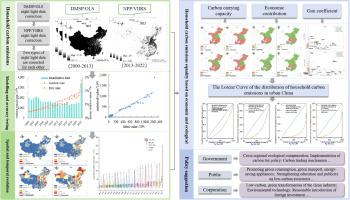从生态和经济贡献的角度探讨城市家庭碳不平等:基于夜间灯光数据的经验证据
IF 6.3
2区 经济学
Q1 ECOLOGY
引用次数: 0
摘要
管理和优化家庭碳排放已成为气候政策的重要组成部分。将公正过渡纳入气候行动,对实现可持续发展具有深远意义。本研究利用2000年至2022年中国284个城市的夜间照明数据来计算家庭碳排放量。研究了家庭碳排放的平等性与收入水平和生态承载力的关系,揭示了家庭碳排放平等性的驱动因素。结果表明,我国居民碳排放呈持续增长趋势。约18%的城市表现出更大的经济贡献,而50%的城市表现出更大的生态承载力贡献。2017年以前,收入水平与居民碳排放的基尼系数表现为相等,而生态承载力与居民碳排放的基尼系数表现为不相等。中国东部和中部地区的部分城市承担着经济贡献不平等的负担,而东北和西部地区的城市则承担着生态承载力贡献不平等的负担。人口密度、经济增长、互联网普及率、产业结构和开放程度对居民碳排放不平等存在异质性影响。建议制定不同收入群体的碳包容机制,推进家庭碳排放精细调控和数据分层管理,完善生态补偿机制,提升区域协同治理能力和信息共享机制。这些措施旨在实现扶贫和减排的双重效益。本文章由计算机程序翻译,如有差异,请以英文原文为准。

Exploring urban household carbon inequality in terms of ecological and economic contributions: Empirical evidence based on nighttime light data
Managing and optimizing household carbon emissions has become an essential part of climate policy. Integrating a just transition into climate action holds profound significance for achieving sustainable development. In this study, nighttime light data are used to calculate household carbon emissions in 284 Chinese cities from 2000 to 2022. The equality of household carbon emissions is investigated in relation to income levels and ecological carrying capacity, revealing the underlying driving factors. The results indicate that household carbon emissions have been continuously increasing. Approximately 18 % of cities demonstrate a greater economic contribution, whereas 50 % of cities show a greater contribution to the ecological carrying capacity. The Gini coefficient between income levels and household carbon emissions demonstrated equality prior to 2017, whereas the Gini coefficient between the ecological carrying capacity and household carbon emissions indicated inequality. Some cities in the eastern and central regions in China bear the burden of economic contribution inequality, whereas cities in the northeastern and western regions bear the burden of ecological carrying capacity contribution inequality. Population density, economic growth, internet penetration, the industrial structure, and openness exert heterogeneous impacts on the inequality of household carbon emissions. It is recommended that carbon inclusion mechanisms be formulated for different income groups, fine-tuned household carbon emissions regulation and data stratification management be promoted, ecological compensation mechanisms be improved, and regional synergistic governance capacity and information-sharing mechanisms be upgraded. These measures aim to achieve the dual benefits of poverty alleviation and emission reduction.
求助全文
通过发布文献求助,成功后即可免费获取论文全文。
去求助
来源期刊

Ecological Economics
环境科学-环境科学
CiteScore
12.00
自引率
5.70%
发文量
313
审稿时长
6 months
期刊介绍:
Ecological Economics is concerned with extending and integrating the understanding of the interfaces and interplay between "nature''s household" (ecosystems) and "humanity''s household" (the economy). Ecological economics is an interdisciplinary field defined by a set of concrete problems or challenges related to governing economic activity in a way that promotes human well-being, sustainability, and justice. The journal thus emphasizes critical work that draws on and integrates elements of ecological science, economics, and the analysis of values, behaviors, cultural practices, institutional structures, and societal dynamics. The journal is transdisciplinary in spirit and methodologically open, drawing on the insights offered by a variety of intellectual traditions, and appealing to a diverse readership.
Specific research areas covered include: valuation of natural resources, sustainable agriculture and development, ecologically integrated technology, integrated ecologic-economic modelling at scales from local to regional to global, implications of thermodynamics for economics and ecology, renewable resource management and conservation, critical assessments of the basic assumptions underlying current economic and ecological paradigms and the implications of alternative assumptions, economic and ecological consequences of genetically engineered organisms, and gene pool inventory and management, alternative principles for valuing natural wealth, integrating natural resources and environmental services into national income and wealth accounts, methods of implementing efficient environmental policies, case studies of economic-ecologic conflict or harmony, etc. New issues in this area are rapidly emerging and will find a ready forum in Ecological Economics.
 求助内容:
求助内容: 应助结果提醒方式:
应助结果提醒方式:


